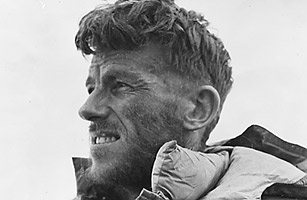
(4 of 7)
Was he a congenial mate?
Yes, very, very. It wasn't easy to communicate with him in those days. Although he spoke a certain amount of English, we couldn't discuss the philosophy of life, that kind of thing. But mountaineering decisions and so on, he was able to deal with those.
Do you remember the climb vividly?
I remember it pretty vividly. I remember we almost broke down on the Lhotse Face. George and I and the Sherpas were on the Lhotse Face, and we simply weren't making any progress for a week or so. I persuaded John to let Tenzing and me go up and start things moving again — otherwise we simply weren't going to get anywhere — and finally he agreed. We did that and we shot up. It was Tenzing, me and Wilf Noyce. We climbed to 24,000 feet, and we sort of got things rolling again.
A bit later, when the big lift to the South Col was imminent, the party was making very slow progress, and once again I persuaded John that Tenzing and I should go up quickly and then more or less lead them up to the South Col. John somewhat reluctantly agreed. John wanted me and Tenzing not to wear ourselves out before the final push. But I was perfectly O.K.
We had the meeting to talk about the summit strategy and who would make the final push. It really wasn't tense for me. I would have been very surprised if Tenzing and I had not been given the job of making the final assault.
We established our last camp at just under 28,000 feet. I can remember there were some very fierce gusts of wind whistling around the mountainside. We would hear it coming before it actually hit our cotton tent on this sloping, snowy ledge, and Tenzing and I were inside and it seemed to us that the main thing holding the tent down was our weight. We didn't know anything about windchill factor in those days, but the windchill factor must have been very considerable. And I really felt that night, with the wind blowing as it was, that we might have trouble with the summit. I have never been the sort of person who is absolutely confident that he is going to reach the summit of any mountain. I was always very much aware of the fact that weather conditions or snow conditions could make getting to the summit difficult or even impossible.
But early in the morning the wind eased off. There was still wind all the way up, but it wasn't anywhere near as severe. I looked out of the tent about 4:30 in the morning, and there were clouds around, but it was a good deal clearer, so I realized that we had a good chance to put in a push towards the summit.
I was absolutely certain that Tenzing and I could do this. Tenzing was keen to go. We knew that the conditions were good enough, so we just made our preparations and pushed on.
I wouldn't say the final push was fun. It was jolly hard work, actually, and the long slope up to the South Summit had soft snow, and we were very concerned about the potential avalanche. But, you know, as I've said many times, this was Everest, so we felt we had to push it a bit harder than maybe we would ordinarily.
Once we climbed that step on the ridge, which is now called the Hillary Step, the ridge sort of ran away, almost out of sight. You couldn't really see exactly where the top was. We couldn't find the summit. It wasn't until we came to a place where we could see that the ridge ahead dropped away, and we could see Tibet in front of us, that I realized we must be pretty close to the summit. Up above us the snow rounded off into a dome, and we realized that that must be the top. It's not a really sharp summit — the sort you hold your hands around. It's a summit that you can stand on reasonably comfortably. Six or eight people could probably all stand together. A nice summit.
I took my oxygen off and took photographs down all the leading ridges, just to make sure I had plenty of evidence that we had actually got to the top. Then I looked across at Makalu and I can remember assessing the routes up Makalu, which hadn't yet been climbed. I began mentally working out a potential route to the summit, which was actually the route by which it was finally climbed.
You never stopped working.
No, even on top of Everest, I was still looking at other mountains and thinking of how one might climb them.
When we got to the top, I didn't really have a tremendous feeling of ecstasy or joy. I didn't leap around or throw my hands in the air or something. We were tired, of course, and I was very much aware of the fact that we had to get safely down the mountain again. I think my major feeling was one of satisfaction, I really did have a feeling of "Well, we've finally made it." I know I had a little feeling almost of surprise, too, because there had been a lot of other very good expedition attempts at Everest, and they had not been able to get to the top, and here finally Tenzing and I were there. I certainly didn't have an arrogant feeling.